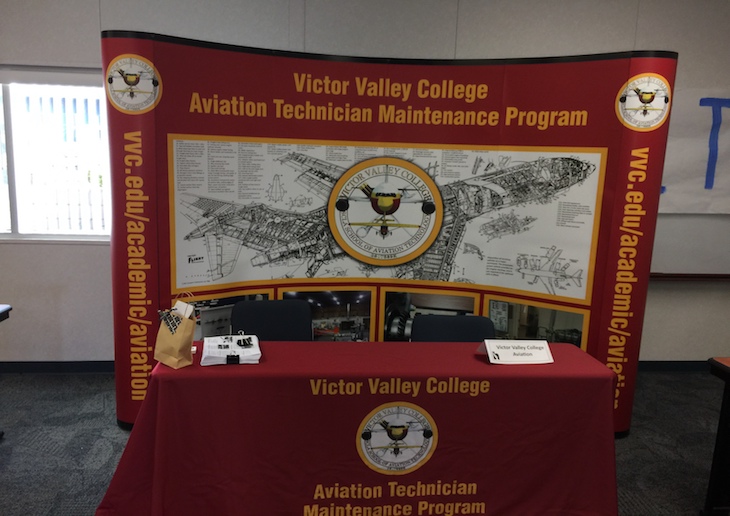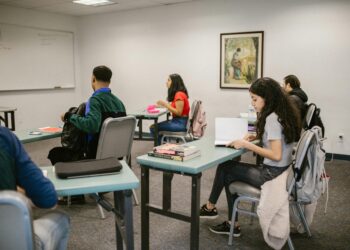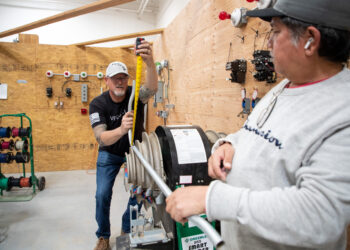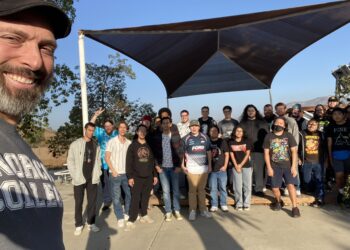Reaching for the Stars

Joseph Christian often looks towards the skies when contemplating his future—the stars are bright in the High Desert Community of Victorville where he grew up. And thanks to an innovative career education pipeline involving Victor Valley College, area employers, and several local high schools, so is Christian’s future.
“I want to work on mechanisms that go into space,” says Christian, who is well on his way to reaching his goal of becoming an aeronautical engineer. Christian, who works at General Atomics, will graduate from Victor Valley College in May and then transfer to Embry-Riddle Aeronautical University.
“I love the concept of sending objects to places that have never been seen before by human eyes,” says Christian. “I really owe a lot to my high school teachers for guiding me into the Victor Valley College program and setting me on this path.”
The path Christian speaks of was made possible by the K16 Bridge Program, a program designed by K-12 and community college teachers, counselors, and administrators that creates a pipeline from high school to community college and eventually, a career.
“Not everybody wants to or can afford to go to a four-year university,” said Chris Piercy, a Political Science teacher at Serrano High School and adjunct instructor at Victor Valley College, who spearheaded the program’s development 13 years ago. “The Bridge Program provides a clear pathway for those who want to get the skills at Victor Valley College needed to get a good job, and then if they want to go on to a four-year college or university, they can.”
Christian’s story is a prime example of how the Bridge Program is designed to work. After enrolling in the Bridge Program while still a senior at Serrano, Christian started taking college courses at night on aircraft engines, systems, and airframes. “They cover all the bases,” says Christian. “Reciprocating engines turbines, hydraulics, electrical components, landing gears, and every other system involved with aircraft.”
These courses led to work as a junior mechanic at ComAv, which led to a job at General Atomics as an airframe and powerplant specialist where he was assigned to a team developing military drones. Last summer, Christian landed an internship with NASA at Edwards Air Force Base, where he worked on the NASA X-57 Maxwell, an experimental, all-electric aircraft.
“Joseph’s story speaks to the power behind the career education programs that our region offers,” says Chris Ohshita, department chair of the Victor Valley Aviation Maintenance Technology Program, which works closely with ComAv Integrated Solutions, a Victorville-based firm that serves as a global airframe and aviation powerplant support provider for the aircraft industry.
“Most of the students in our program get hired by three major companies in our area: ComAv, Northrup Grumman, and General Atomics,” says Ohshita. “ComAv is located right next door to us, and they recruit our students while they’re still in the program. They bring them on as junior mechanics or interns and they allow them to grow with the company. Students have part-time and sometimes full-time jobs with ComAv while they’re going to school. They’re directly linked with the industry. What they’re talking about in the classroom is what they’re doing at work.”
Despite his accomplishments, Christian isn’t done reaching for the stars. He now plans to continue working at General Atomics while attending Embry-Riddle Aeronautical University’s satellite campus at Edwards Air Force Base in his quest to secure a bachelor’s and master’s degree.
“Victor Valley College gave me the opportunity to do all of this,” Joseph Christian said. “You have to put in the work, nothing is handed to you, but you get plenty of support and assistance from instructors who have worked in the industry and want to see you succeed.”
By the looks of it, Christian is well on his way to success, and the stars.



